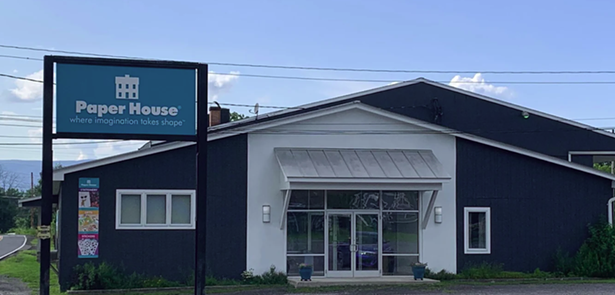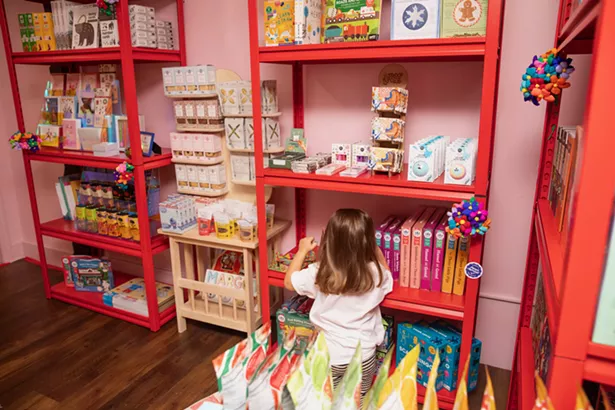Amy Hernandez-Metcalf, vice president at Paper House Productions in Saugerties, spent multiple days in April poring over 30-plus pages of US tariff rate schedules. She was trying to decipher the complex regulation language about timing for the new 145 percent tariffs on imports from China, where the stationery, scrapbooking, and puzzle company manufactures some of its products. “I felt like a paralegal searching through all that fine print,” she says.
“There’s all this language about if it took off from port by this date and it arrives to you by this date, it’s exempt,” she adds. But shipments are regularly delayed, she explains, so there are no guarantees that the products already shipped out from the Chinese factory they work with were going to arrive by the deadline. “It’s a crapshoot,” she says.
Paper House Productions is just one of millions of small businesses in the US grappling with the twists and turns of the Trump administration’s new trade wars.
After revving up in early March with 25 percent tariffs on Mexican and most Canadian imports, on April 2, the administration enacted a blanket 10 percent tariff on all goods imported to the US, with additional reciprocal tariffs on imports from approximately 90 countries around the world. Just six days later, the administration abruptly reversed course, placing a 90-day pause on all reciprocal tariffs except for China’s, which it raised to a combined tariff rate of 145 percent.
While everyone from global leaders to corporate CEOs and economists have attempted to strike deals and sway the president’s opinion on the higher tariffs before the 90-day pause is up, for many small businesses, the last two months have been filled with unpredictability: rising costs, supply chain delays, and difficult discussions about the future.
The Ramifications of Reversing Decades of Global Manufacturing Infrastructure
Founded in 1983, Paper House Productions has weathered multiple recessions and changes to its supply chain, but nothing like what the 10-person company faces if the 145 percent tariffs on China remain in place or intensify. “We would go out of business,” says Don Guidi, CEO of Paper House Productions. “To have to pay any tariff—let alone the rates we’re at—just eliminates jobs.”

Founded in 1983, Paper House Productions is a stationery, scrapbooking, and puzzle company based in Saugerties.
The company’s story of overseas manufacturing is a familiar one for many US companies. From its founding through the early 2000s, Paper House manufactured all its stationary products in the US. Then, the Great Recession hit, intensifying the pressure on businesses to find cheaper sources of manufacturing. Complicating matters was the fact that the company’s largest retail customer, Target, dropped its products from shelves during the Recession as part of its own cost-saving measures.
To make up for its loss in revenue, the company developed a marquee product that is now its largest category: a three-dimensional sticker popular with scrapbookers. To create the sticker’s 3-D effect, the company works with factories in China, which complete the product’s meticulous layering by hand. “There’s no machine that can do it and there’s nobody trained to do that in the US,” says Hernandez-Metcalf. “Even if you could make it in the US, it would cost twice as much.”

Courtesy Paper House Productions
To produce Paper House Productions’ marquee product, a 3-D sticker popular with scrapbookers, the company works with factories in China, which complete the sitcker’s meticulous layering by hand.
After searching through all those tariff regulations, Hernandez-Metcalf finally found an exemption that lowered the rate for certain categories of paper goods they were importing from China to 27.5 percent. Guidi says that the company has forecasted its cashflow with the new tariff rate through the end of 2026. In tandem with pricing concessions it’s working out with its Chinese manufacturers, the company is still planning to raise average prices by 22 percent on July 1. “That’s huge for us,” says Guidi. “We haven’t raised prices like that ever.”
While one of the Trump administration’s aims in enacting tariffs is to boost domestic manufacturing, small businesses like Paper House Productions are caught in the crosshairs of a decades-long process of infrastructure and knowledge loss. Spinning up production stateside again, they say, isn’t feasible any time soon. “You can’t do that on a dime,” says Hernandez-Metcalf. “You can’t do that in six months. You probably can’t even do it in three years.”
A Threat to Wine’s Recession-Proof Reputation
“The uncertainty is almost as much of a killer as something that’s real,” says Innis Lawrence, co-owner of the Ollie’s Group, which owns Ollie’s Pizza in High Falls, as well as Ollie’s Slice Shop, Eliza, Fletcher & Lu, and Kingston Wine Co. in Kingston. “No one is willing to make a move because we don’t know what’s coming down the pipeline.”

Innis Lawrence, co-owner of the Ollie’s Group, which owns Kingston Wine Co. says price increases caused by tariffs could be seen by customers as soon as the end of this month, with significant supply chain effects felt by June or July.
Lawrence and his business partners are seeing supply chain disruptions in their restaurant group crop up in places small (previously reliable orders for everything from labels and latex gloves are delayed) and large. “Europe is essentially not shipping wine to the US right now,” he says.
With the 10 percent base tariff in place and Trump previously floating the idea of a 200 percent tariff on European wine, champagne, and spirits, Lawrence says that importers and exporters alike are spooked. On average, it takes six to eight weeks for wine to make its way to the US on a cargo ship, raising the specter that new tariffs could be enacted before a shipment even arrives at port.
Lawrence says price increases at Kingston Wine Co. could be seen by customers as soon as the end of this month, with significant supply chain effects felt by June or July. “Some of the reps that we deal with are stressed that by midsummer they won’t even have any inventory to sell,” he says.
Add to the picture that total alcohol sales declined in 2024 for the first time in three years due to increased consumer interest in low or no-alcohol beverages and competition from legalized cannabis products, and Lawrence says wine is on its way to losing its recession-proof reputation.
“Everything is getting more expensive,” he says, noting the longstanding effects of Covid-era price increases on the restaurant industry. “It’s exhausting. We’re constantly trying to oversee the cost of things and just try to make things more profitable—just to make it profitable at all.”
A Retail Space Leans on Community
Largely inspired by Kristin and Nick Bograd’s four-year-old daughter Margot, their small Goshen shop Margot’s Mercantile carries an array of toys and crafts for toddlers and early elementary-aged kids, treats made with high-quality ingredients, and small-batch apothecary items.
In the seven months since opening, the Bograds say that over 50 percent of their sales are from return customers—primarily parents and grandparents looking for alternatives to big-box kids’ toy options, and snack hounds on the hunt for hard-to-find specialty candies.
Though the Bograds focus on sourcing high-quality non-plastic toys—many of which come from heritage brands in France and Germany—nearly 80 percent of all toys sold in the US are manufactured in China, according to industry group the Toy Association.
With the makers of half their inventory potentially subject to a 145 percent tariff rate, the Bograds, who have a combined 25+ years’ experience in corporate retail, have been busy crunching their numbers, strengthening relationships with vendors, and making plans to add family-friendly events to the mix.

Photo by Jessica Jane Photography
To mitigate the effect of any tariffs on toys on their bottom line, the Bograds are expanding to better meet the needs of their return customers—many of whom are local families.
“Sixty percent of our toy brands are increasing prices. We’re trying to negotiate to maybe split the difference so it doesn’t all go directly to the customer,” says Kristin. “We’re really lucky to have met most of our toy vendors in person.” Some companies, they say, are also working with them to stock up on pre-tariff items and lengthening their payment terms to help them do so for popular inventory.
To mitigate the effect on their bottom line, the Bograds are expanding to better meet the needs of their return customers. They’ve added monthly art workshops for kids ages 3 to 9, are considering adding a monthly game club, and will soon be a pickup location for a local organic farm’s CSA.
“We want to be a place where people gather,” says Kristin, “It’s been incredible, the sense of community that we’re creating just by seeing people weekly and being a safe space where they can talk about what they’re going through, their struggles and their celebrations.”
The Silver Lining for Local Agriculture
After 16 years as a floral designer in the corporate branding world, Eliza Beers moved to Broome in the Catskills and founded Boom & Bloom, a sustainable and inclusive floral design studio, in 2022. In addition to her events work for weddings and celebrations, Beers also acts as a wholesale floral broker between local flower farms and the New York City flower market.
As the tariffs have gone into effect, trends on the two sides of her business have moved in opposite directions. “I thought that the events portion of my business was going to double this year, and then after the tariffs went into place, people started being more conservative with their personal spending,” Beers says. Normally, she says that by March most local venues are booked up, but not this year. “People are nervous to spend a big chunk of their savings or income on a wedding,” she says.
Conversely, demand for locally sourced flowers is up. “International product is now about 40 percent more expensive than it was a few months ago,” she says. Historically, high-volume events producers and flower shops primarily sourced flowers grown outside the US to keep costs low.

Photo by Erin Glover Photography
A wedding featuring Boom & Bloom floral design at Bright Sparrow Farmhouse. Though tariffs have increased preferance for locally grown flowers, many couples are hesitant to plan an expensive wedding in the current economy.
With prices more comparable between the domestic and international markets, Beers is now seeing that buyers are opting to purchase better quality flowers that last longer—a benefit to local flower farmers. “It’s great for the local economy and it’s great for the environment, however, I think I’m one of the rare instances where it’s going to have a positive effect,” she says.
Though a boost to local agriculture is in line with the Trump administration’s tariff goals, Beers cautions against looking at the increased bump in sales in isolation. In January, for instance, the administration froze billions of dollars of USDA funding, including reimbursement payments for farmers who had already paid to invest in on-farm conservation projects. And with tariffs on the Netherlands on the rise, she is also expecting next year’s crop of tulips grown by local farmers from Dutch bulbs to double in price.
“I’m happy that I’m able to work with local people and kind of circumvent this,” she says. “But then I turn around and realize, oh no, I missed that part of the equation.”
This post was originally published on this site be sure to check out more of their content










